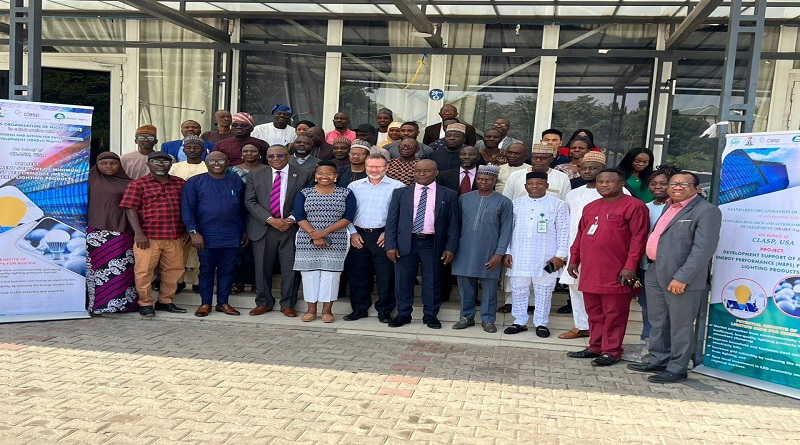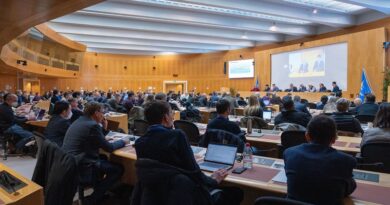SON, SRADev call for compliance on Minimum Energy Performance Standards on lighting products
Photo caption: Group photograph of participants at the awareness workshop on MEPS organised by SON in conjunction with SRADev Nigeria on Wednesday 13th December 2023 in Abuja.
The Standards Organisation of Nigeria (SON) and the Sustainable Research and Action for Environmental Development (SRADev Nigeria) have called for compliance to the Minimum Energy Performance Standards (MEPS) set for Nigeria’s lighting products.
Essentially, they stressed that MEPS for lighting will contribute to the phasing out of the least efficient lamps and toxic material containing lamps in the market by setting the minimum levels of energy efficiency that a lamp in each given class must meet before it can be sold in the market.
Besides, that when effectively implemented, MEPS for lighting, in conjunction with supporting policies will reduce power demand on the grid, reduce energy cost, protect the environment.
Other benefits of MEPS listed include reduction in energy consumption; industrial growth; reduces unemployment (job creation); improves economy; improves standard of living and protects the environment.
In his keynote address at a day-long awareness workshop on MEPS and labeling for lighting in Nigeria organized by SON in collaboration with SRADev Nigeria held in Abuja on Wednesday 13th December 2023, Director- General of SON, Dr. Ifeanyi Okeke, said MEPS are special regulations that have been put in place to set a benchmark of energy efficiency that a product must meet to be sold in the market.
As part of its measures to promote energy efficiency and protect Nigeria from becoming a dumping ground for various inferior commodities, the Standard Organisation of Nigeria (SON) has concluded plans to adopt the Minimum Energy Performance Standards (MEPS) for Nigeria’s lighting products.
The SON chief, who was represented at the event by Adewunmi Richards, the director of Laboratory Services, explained that, by setting minimum energy efficiency requirements for lighting products, governments ensure that only energy-efficient options are available for consumption.
He added that these standards are fundamental to reducing energy consumption, lowering greenhouse gas emissions, and promoting a sustainable future for all Nigerians as the world gradually transitions to cleaner energy sources.
In his presentation on “Development of Nigeria MEPS: Journey so far”, Olakunle Owoeye, stated that the project started early in the year with collaborative outreach and regional proposal, followed by stakeholder engagement: Inception workshops and commitments, working group meeting, technical committee deliberations and standards adoption, awareness workshops and path to enforcement and enforcement.
He said the awareness raising/dissemination workshop marks the culmination of the journey, disseminating information for and garnering support.
Executive Director, SRADev Nigeria, Dr. Leslie Adogame, disclosed that efficient energy solutions such as LEDs should be deployed as alternatives to supply families with 24-hour energy demands.
He stressed further that apart from the energy efficiency issue, one of the major challenges that MEPS intends to address is the presence of mercury in the majority of lighting items to save Nigeria from becoming a haven for counterfeit electrical devices.
“It is one thing to talk about the transition to LEDs, which are energy efficient and mercury-free; it is another thing to have standard-quality materials for use that can last for a reasonable period,” Adogame said.
He expressed regret over the fact that many goods that don’t have the necessary energy capacity are shipped into Nigeria, which is sad because it’s like creating a problem while trying to solve another.
Stakeholders, according to him, have all accepted the process and are waiting for SON to roll out its implementation to ensure that manufacturers and importers comply with those standards.
The SRADev Nigeria chief assured that with the unveiling of these new regulations, very soon Nigerians will no longer have sub-standard LEDs as currently found everywhere across the country.
CLASP manager, Monica Wambui, said MEPS pushes consumers closer to her efficiency.
This, in her opinion, means energy savings because, as electricity customers, “we are always looking at our pockets,” adding that above all, MEPs ensure that mercury is no longer used in lighting products.
She bemoaned the fact that many homes still use fluorescent lights, which contain mercury and are quite harmful.
However, because energy-efficient bulbs do not contain mercury, they not only preserve human health but also promote environmental safeguards, she explained.
“It is also helping in reducing and achieving the carbon emission target because energy efficiency contributes to reducing carbon emissions and helping to achieve the 1.5 degree Celsius that has been set for global warming,” Wambui said.
As a signatory to the Minamata Convention, Nigeria is expected to eliminate the use of mercury-added products such as fluorescent, which are inefficient toxic lighting that the entire global community has accepted as needing to be phased out by 2027 because of their health, environmental implications, and because they are not energy efficient.
The reasons adduced for this is that mercury damages the skin, affects the vision, causes weakness, kidney damage and destroys the environment.
On labeling, it was disclosed that the following information shall be available on the energy label: manufacturer name or trade mark; supplier’s model identifier; type of bulb technology, the energy efficiency class; minimum energy performance is 1 star; the QR-code, linking to the model information available in the public part of the product database; ECOWAS logo and annual electricity consumption based on 1000 hours.




